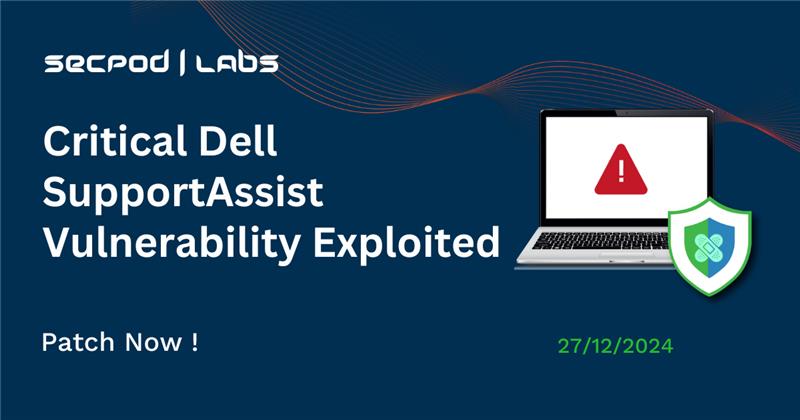Dell announced a critical security vulnerability affecting its SupportAssist software, widely used for system diagnostics and updates on Dell PCs. Identified as CVE-2024-52535, this flaw poses significant risks to cybersecurity experts and end-users.
Understanding the Vulnerability
Dell SupportAssist versions up to 4.6.1 for Home PCs and up to 4.5.0 for Business PCs contain a symbolic link (symlink) attack vulnerability within the software remediation component. This flaw allows a low-privileged authenticated user to escalate privileges, potentially leading to the arbitrary deletion of files and folders on the system.
The vulnerability has been assigned a CVSS base score of 7.1, categorizing it as ‘High’ severity. The CVSS vector (AV: L/AC: L/PR:L/UI:N/S:U/C:N/I:H/A: H) indicates that the attack requires local access, low attack complexity, and low privileges, with no user interaction needed.
Implications for Users
The primary risk associated with this vulnerability is privilege escalation. An attacker with local access could exploit this flaw to gain higher system privileges, enabling them to delete critical system files or user data. Such actions could lead to system instability and data loss and potentially render the system inoperable.
Mitigation Measures
Dell has addressed this vulnerability by releasing updated versions of SupportAssist:
- SupportAssist for Home PCs: Users should update to version 4.6.2 or later.
- SupportAssist for Business PCs: Users should update to version 4.5.1 or later.
To ensure protection, users are advised to:
- Check Current Version: Open Dell SupportAssist and verify the version number.
- Update if Necessary: If running an affected version, download and install the latest release from Dell’s official website.
- Enable Automatic Updates: Configure SupportAssist to receive automatic updates, ensuring timely protection against future vulnerabilities.
Broader Context
This incident underscores the importance of regular software updates and vigilance in system maintenance. SupportAssist, designed to enhance system performance and security, ironically became a potential attack vector due to this flaw. Such occurrences highlight the need for both users and developers to prioritize security in software development and usage.
Conclusion
The CVE-2024-52535 vulnerability in Dell SupportAssist serves as a critical reminder of the ever-present need for cybersecurity tools. Users must remain proactive in updating software and monitoring system health to safeguard against potential threats. By promptly applying the recommended updates, Dell users can protect their systems from this specific vulnerability and contribute to a more secure computing environment.
SanerNow Patch Management
SanerNow Patch Management is an automated tool designed to streamline the process of identifying, prioritizing, and deploying patches across various operating systems, including Windows, macOS, Linux, and over 550+ third-party applications.
It offers features such as continuous scanning for missing patches, automated deployment, and rapid availability of the latest updates within 24 hours of release. The platform also includes capabilities for testing patches in a non-production environment before deployment, patch rollback in case of issues, and comprehensive reporting to track patching status and compliance.
SanerNow’s cloud-based console facilitates remote patching, making it suitable for managing globally distributed devices. Additionally, by automating end-to-end patching tasks, SanerNow aims to reduce manual efforts, minimize errors, and enhance an organization’s overall security posture.


